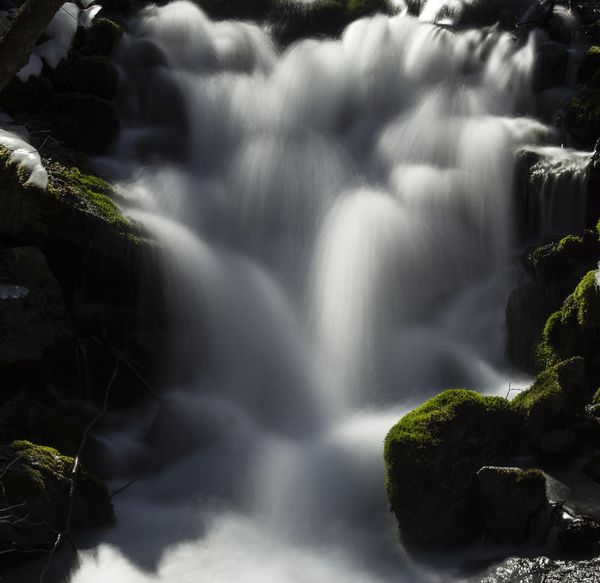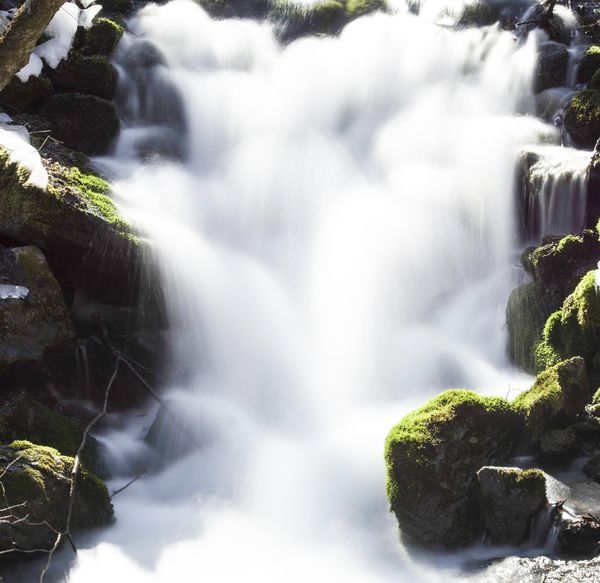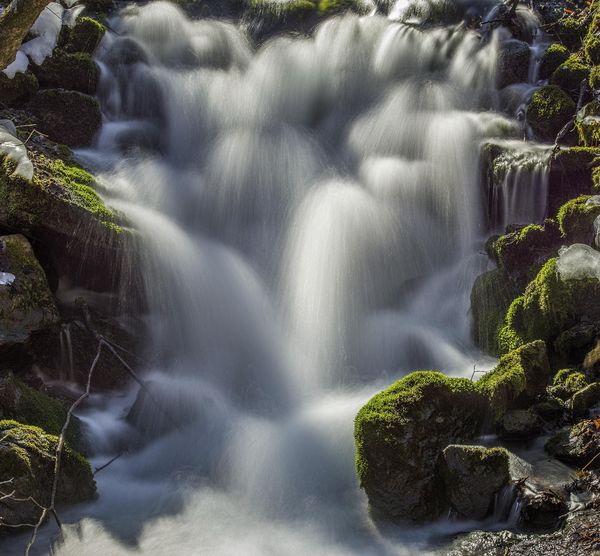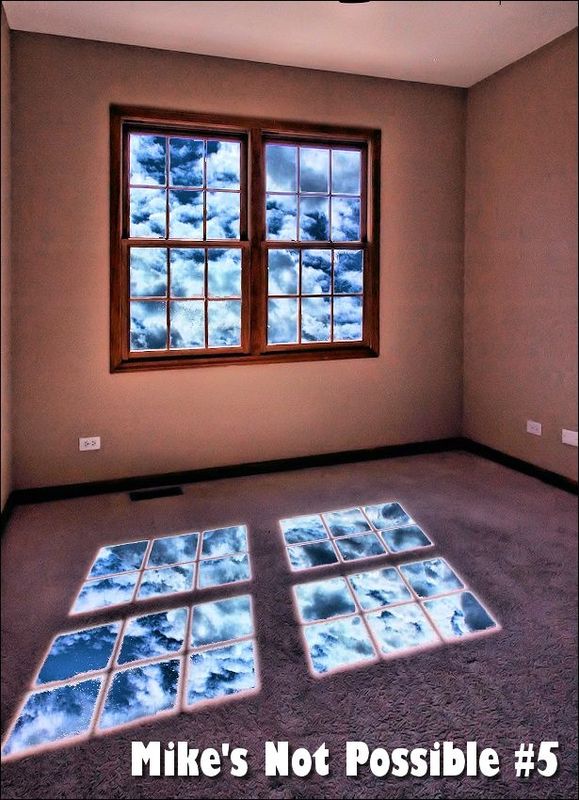Post Processing: Is It Cheating, Deceptive, Misleading, even Unfair? (...ad infinitum ad nauseam...)
Jan 25, 2016 20:06:22 #
minniev wrote:
Thanks, Minnie! I couldn't agree more! :thumbup:So glad to see you back, Chuck! br br Yes, to ma... (show quote)
Jan 25, 2016 23:34:45 #
Yes and no. Its cheating if your intention is to cheat. It is deceptive if your intention is to deceive etc etc ad nauseum. The moral judgement is based on your intent, not on your post processing.
Jan 26, 2016 00:11:37 #
Hell, I might as well get my nickels worth in.
Whether anyone likes it, or not, photoshop is here and it's not going anywhere. Is it deception? IMHO, only if the photog claims it came straight out of the camera. Photographers have been "post editing" since we were painting on rocks!!
The only real quarrel I have with PE is when it is used as a crutch. Not taking the time to learn the craft by taking poorly shot images and dumping them into PS play with a few sliders. Then claim it as a work of art.
Whether anyone likes it, or not, photoshop is here and it's not going anywhere. Is it deception? IMHO, only if the photog claims it came straight out of the camera. Photographers have been "post editing" since we were painting on rocks!!
The only real quarrel I have with PE is when it is used as a crutch. Not taking the time to learn the craft by taking poorly shot images and dumping them into PS play with a few sliders. Then claim it as a work of art.
mcveed wrote:
Yes and no. Its cheating if your intention is to cheat. It is deceptive if your intention is to deceive etc etc ad nauseum. The moral judgement is based on your intent, not on your post processing.
Jan 26, 2016 08:12:44 #
The argument must be put in context. What is the intent of the image? As a photojournalist with a quarter century in the field, I would never dream of actually altering the content inside the frame IF I am intending it to be an accurate representation of an event. Otherwise, why the hell not? Even in photojournalism, we are clearly permitted to crop an image, therefore excluding elements that might be significant for an understanding of what the image represents. In the larger sense, any image is a selective representation, as it includes a limited angle of view and is frozen in time.
Post processing itself is an inaccurate, misleading term. All images that are viewable are "post processed", in that some algorithm has to decide how the raw sensor data is to be represented in terms of chroma and luma values of the pixels. You can't view a raw file. Either the camera will "post process" your raw according to its preprogrammed, inflexible algorithms, or you can do it in an image editor like PS, which has many more options to maximize the impact and/or viewable information in the final image.
People at this point tend to talk about what is "natural". Nothing is natural. A photograph is a representation of physical reality. "Natural" generally means to people what they are used to seeing in a two-dimensional representation of three-dimensional reality, frozen in time. The blown highlight and crushed shadows of a normal photograph are simply what was possible in the past; modern sensors are capable of much more, but people are not used to seeing extended dynamic range, and so they call it "dishonest".
I'm posting a couple of pix here. The first is SOOC. The second has simply had the exposure raised to simulate what it would have been like SOOC exposed for the shadows. The third has been "post processed" to raise the shadow values while preserving the highlights. Which do you think is most "natural"?
End of rant. Thanks for listening.
Post processing itself is an inaccurate, misleading term. All images that are viewable are "post processed", in that some algorithm has to decide how the raw sensor data is to be represented in terms of chroma and luma values of the pixels. You can't view a raw file. Either the camera will "post process" your raw according to its preprogrammed, inflexible algorithms, or you can do it in an image editor like PS, which has many more options to maximize the impact and/or viewable information in the final image.
People at this point tend to talk about what is "natural". Nothing is natural. A photograph is a representation of physical reality. "Natural" generally means to people what they are used to seeing in a two-dimensional representation of three-dimensional reality, frozen in time. The blown highlight and crushed shadows of a normal photograph are simply what was possible in the past; modern sensors are capable of much more, but people are not used to seeing extended dynamic range, and so they call it "dishonest".
I'm posting a couple of pix here. The first is SOOC. The second has simply had the exposure raised to simulate what it would have been like SOOC exposed for the shadows. The third has been "post processed" to raise the shadow values while preserving the highlights. Which do you think is most "natural"?
End of rant. Thanks for listening.
SOOC

(Download)
Exposure for the shadows, as it would be SOOC in that case

(Download)
"Post processed"

(Download)
Jan 26, 2016 08:32:34 #
Chuck_893 wrote:
b Yeah, so weve been here recently and this IS f... (show quote)
Hey Chuck,
Yep, this subject has been discussed time and time again, but you know, I never seem to get tired of it since there always seems to be some new, possibly minute, comment someone makes that adds to the debate one way or another. :-)
I just had a discussion with two photographers, in person, about the very same topic and they both agreed that PP'ing is absolutely OK and acceptable. Ansel Adam's has a fairly famous photograph that looks fantastic (the one that is usually shone or printed). However, if you see his original out of the camera shot, it is awful!!! I wish I could remember what it is called or provide more information, but it totally escapes me. Film darkrooms were used for PP'd images, enhancing images, combining images etc., so why in the world is everyone so perturbed about using Digital Darkrooms such as Photoshop, LR, Macphun Programs, On1 programs, FX Pro Studio, Affinity, Gimp, Portrait Pro, etc., etc., etc.?
That is basically nonsense as long as photojournalists, and whomever else, do not make adjustments for profit or are forbidden by their industry. Personal use as well as commercial use is fine, just as long as it isn't overdone or they are not trying to 'put one over" on people and be deceptive with malicious intent, just as you had said. My goodness, has anyone really paid any attention to the TV programs and political campaign images or advertisements on TV? I just saw an interview on TV with Hilary Clinton, and it was so blatant the air brushing or whatever TV stations can do with images of people on screen. There was an actual line on the screen where you could see the difference in her facial skin and dress/suit where it was applied and where they had 'cut it off!' Absolutely amazing. There wasn't a blemish or a wrinkle or whatever on her skin or her clothing, not even a piece of lint or minor wrinkle or crease or any sign of aging on her face, and it was not just a cover up by makeup! And we all know that there are never any cover-ups by political candidates or the government or the armed services, right!?!?!
Oh, yes, let's not forget about what all magazines (probably newspapers that still exist, as well) do to their printed images of models, glamour stars, celebrities, and important people. People in real life most often do not look like how they are presented in print and photographs. Heck, even head shots of CEO's and corporate executives are most assuredly doctored up in PP'ing.
I like what you had done with the images you chose to upload. You did a very nice job and definitely improved upon the photos. Well done, Chuck, keep up the good work! :-)
Oh, and let's not forget about photographers like Cliff who does super senior portraits for parents. He is a master of composites using parts from many images and combining them into one that is loved by the senior's parents. And he makes no bones about what he does . . . he tells parents what he plans on doing and what he has done . . . and does it in PP'ing with digital enhancement programs. Russ is another exceptionally fine digital artist with his Unique method(s) of changing RAW images into superb B&W images of homeless men on the streets of various cities. Those are just two UHH member photographers who immediately come to mind.
So, Chuck, I think it is most appropriate and often times necessary to use Digital PP'ing when developing digital images. I think it is here to stay and even improve as time goes on. Once I am dead, I'd love to see future improvements and innovations in the PP'ing software programs and how they change. Cheers, Everyone.
Best Regards,
Tom
P.S. I just finished and saw what kymarto posted. He says it very well, and his knowledge and experience just adds more for the subject of promoting PP'ing images out of camera. He is absolutely correct . . . shoot images in jpeg and the camera does the PP'ing for you automatically, so no photo is actually really displayed as the human eye sees it. I shoot in RAW all the time, and people would be absolutely outraged if they just saw the RAW image, and, photos would be totally unacceptable by 99.9% of the viewers.
Jan 26, 2016 09:54:01 #
Well said. I rarely take an image without quickly thinking about how I will be making it in pp. The entire process is pure fun for me too. Not sure why there seems to be a sense of pride and accomplishment for a segment of photographers who hold that straight out of the camera is the holy grail. To each her own.
minniev wrote:
So glad to see you back, Chuck! br br Yes, to ma... (show quote)
Jan 26, 2016 10:10:13 #
I'm going to join this fray, although most I'm sure won't want to see my point. I've been a film shooter most of my life. I got really good images because I worked at it. I also have a darkroom and I worked at printing the images the best I could. This included using color filters, dodging, burning and sometimes making double exposures either in-camera or on the enlarger.
When I finally went digital, I got Photoshop, but didn't do anything other than color balance and density adjustments to the ENTIRE image only. That was the same thing I did in the darkroom.
I shot mainly journalistic images and the editors required the images to be quite real. That precluded taking things out or putting things in. That is still my mindset. However, the more I delve into the "fine art" world, the more I see value in being able to "fix" things - like annoying people or wires . Only once have I actually done what I would call changing an image by moving things around. I try to not feel guilty about having done it because it did make for a more balanced image, and I owned up to it up front.
So my position on this matter is clearly based on the final use of the image. If it's journalistic, then minimal adjustments (color balance and density TO REALITY) is all that's allowed. If one's mission is to use photography to create something that wasn't, then manipulation is the tool. It's just not my mission.
My real objection is to people who manipulate their photos but refuse to state that manipulation. Some competitions are quite strict, and some want to claim their image is SOOC when in fact it is quite manipulated - far beyond the limits imposed by the competition.
When I finally went digital, I got Photoshop, but didn't do anything other than color balance and density adjustments to the ENTIRE image only. That was the same thing I did in the darkroom.
I shot mainly journalistic images and the editors required the images to be quite real. That precluded taking things out or putting things in. That is still my mindset. However, the more I delve into the "fine art" world, the more I see value in being able to "fix" things - like annoying people or wires . Only once have I actually done what I would call changing an image by moving things around. I try to not feel guilty about having done it because it did make for a more balanced image, and I owned up to it up front.
So my position on this matter is clearly based on the final use of the image. If it's journalistic, then minimal adjustments (color balance and density TO REALITY) is all that's allowed. If one's mission is to use photography to create something that wasn't, then manipulation is the tool. It's just not my mission.
My real objection is to people who manipulate their photos but refuse to state that manipulation. Some competitions are quite strict, and some want to claim their image is SOOC when in fact it is quite manipulated - far beyond the limits imposed by the competition.
Jan 26, 2016 10:19:11 #
kymarto wrote:
The argument must be put in context. What is the i... (show quote)
==========================
I have "quoted" your well written explanation of Post Processing In-Total = As I truly feel that this is the best explanation about "PP" that I have read outside of a total book about editing.
I am going to copy this and make use of to my students.... That is IF it is OKay with you?
Thank You, "kymarto" for this posting.....
Good Job.
Jan 26, 2016 10:48:11 #
James R wrote:
==========================
I have "quoted" your well written explanation of Post Processing In-Total = As I truly feel that this is the best explanation about "PP" that I have read outside of a total book about editing.
I am going to copy this and make use of to my students.... That is IF it is OKay with you?
Thank You, "kymarto" for this posting.....
Good Job.
I have "quoted" your well written explanation of Post Processing In-Total = As I truly feel that this is the best explanation about "PP" that I have read outside of a total book about editing.
I am going to copy this and make use of to my students.... That is IF it is OKay with you?
Thank You, "kymarto" for this posting.....
Good Job.
I am honored. Thank you. Of course it is OK :)
Jan 26, 2016 11:09:04 #
Nice job, Toby; very well expressed!
one would hope that your disquisition be posted as soon as this topic is raised in yet another (redundant) thread!
Dave
one would hope that your disquisition be posted as soon as this topic is raised in yet another (redundant) thread!
Dave
Jan 26, 2016 12:48:33 #
kymarto wrote:
.... br People at this point tend to talk about wh... (show quote)
Excellent post! Your skillfully processed final image is the one I'd choose any day. It conveys what the scene looked like and how it seemed or felt.
In the quote I isolated above, you have explained so well the factor that we don't ever see discussed - how our own conditioning has persuaded us what we should "expect" from a photograph and strangely skewed our perspective even about what things really look like. Our eyes do NOT see the harsh contrasts that our camera sensors record, so why should we get attached to an image rendered that way when we have the capacity to make it look more like what we experienced? I see many photos posted on UHH that could be improved so much with even some minimal attention to shadows and highlights to address that issue.
Of course I drank the post processing kool aid as soon as I got my first camera, and never looked back, so...
Thank you for this.
Jan 26, 2016 13:12:38 #
Chuck_893 wrote:
b Yeah, so weve been here recently and this IS f... (show quote)
Just to note that my topic: Has "Photoshopping" become a derogatory term?, was about the use of that term as a verb by the general public and the news media. IMO, it is used (by them, not us) to mean "Fake". It was NOT about weather PP or PS are "bad" or "good".
I am a proponent of using PP to its fullest extent. I use HDR bracketing, Topaz Labs tools and all the adjustments I can find and learn to make my photos better. I have a series of manipulated architectural images. For example:
#5 in the series

Jan 26, 2016 16:26:48 #
mcveed wrote:
Thanks! My intent has always been to "make it better." I sometimes wonder if painters have an advantage because they are not restricted to recording the scene as-is. Photographers have not necessarily been "restricted" either, but I think that up until Photoshop, what---30 years ago? it was sometimes harder work for the photographer to manipulate the image. Now we can do pretty much anything, sometimes to our own detriment, but if you learn how to control the thing you can let your imagination run riot. I don't personally want to do much of that. I've always been more of a documentary photographer, but that has never meant that I didn't want to make the very best image I could. I was always a fan of Ansel Adams, and we all know he never stopped printing and reprinting, always striving for something better. I don't think I've ever taken a picture that I didn't think could be improved. I am overjoyed that now, if a seagull isn't in the right spot compositionally, I can "drag and drop" him where I want, seamlessly. I guess it IS deceptive, but it makes for a better picture. :)Yes and no. Its cheating if your intention is to cheat. It is deceptive if your intention is to deceive etc etc ad nauseum. The moral judgement is based on your intent, not on your post processing.
Jan 26, 2016 16:38:06 #
photosbytw wrote:
I quite agree. I have seen I-don't-know-how-many brutal arguments with the SOOC fellas clubbing the RAW guys, both sides calling each other lazy and stupid. My take is, absolutely you need to strive to get it as right in the camera as you can, but anybody can blow an exposure, and there are all sorts of situations where the dynamic range is too broad and you have to compromise. When we shot film we were on tenterhooks until the stuff came back from the lab and it was good...or not. :hunf: Now we can chimp, and boy-howdy do I ever chimp and I don't care. Histograms! Think of them as life jackets! :lol: Nevertheless, I personally have pretty much never taken a digital image that didn't get tweaked, if only to make sure of a good white and black point, long scale, no blocked shadows or highlights, and I don't think I've ever had an SOOC jpeg that didn't need it (I shot all jpeg until last year). My personal digital journey has now led me to $10 bucks a month for Lightroom + Full Photoshop, and I will never look back. BUT I also fully empathize with workers who want nothing to do with it! I love it, he hates it, and so what? Peace and love, Bro! :thumbup: :thumbup:Hell, I might as well get my nickels worth in. br ... (show quote)
Jan 26, 2016 16:45:07 #
mallen1330 wrote:
Just to note that my topic: i Has "Photoshop... (show quote)
Welcome to the fray again:) There have been arguments about this as long as I've been on this forum, but blessedly most of them here are civil. There is so much misunderstanding about post processing, partly because you can use the same program (photoshop and its cousins) to create either a perfectly realistic version of an image or a lovely but fanciful creation like you've shared here.
Those of us who are comfortable with photoshop just see it as a tool set to let us do what we want, without moral connotations. What people use it for varies by intent: it can be used to create a more polished or creative image, or it can be used to fake an event or remove a copyright in order to more easily steal an image. It is the intent that could become misleading, but the tools themselves are just what they are, a goody box for us to enjoy.
If you want to reply, then register here. Registration is free and your account is created instantly, so you can post right away.









